Unit11课文学案
七年级英语上册 Unit 11 What time do you go to school同步学案 新目标
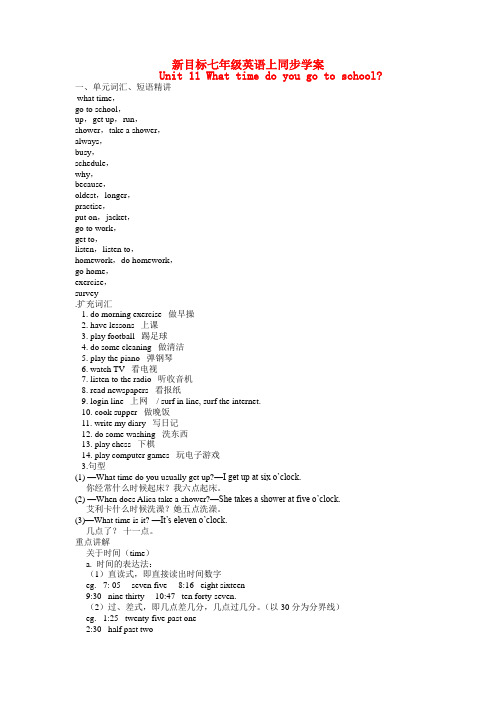
新目标七年级英语上同步学案Unit 11 What time do you go to school?一、单元词汇、短语精讲what time,go to school,up,get up,run,shower,take a shower,always,busy,schedule,why,because,oldest,longer,practise,put on,jacket,go to work,get to,listen,listen to,homework,do homework,go home,exercise,survey.扩充词汇1. do morning exercise 做早操2. have lessons 上课3. play football 踢足球4. do some cleaning 做清洁5. play the piano 弹钢琴6. watch TV 看电视7. listen to the radio 听收音机8. read newspapers 看报纸9. login line 上网/ surf in line, surf the internet.10. cook supper 做晚饭11. write my diary 写日记12. do some washing 洗东西13. play chess 下棋14. play computer games 玩电子游戏3.句型(1) —What time do you usually get up?—I get up at six o’clock.你经常什么时候起床?我六点起床。
(2) —When does Alica take a shower?—She takes a shower at five o’clock.艾利卡什么时候洗澡?她五点洗澡。
(3)—What time is it? —It’s eleven o’clock.几点了?十一点。
八年级英语上Unit 11 Could you please clean your room_ Section B Period 1 学案人教新目标版
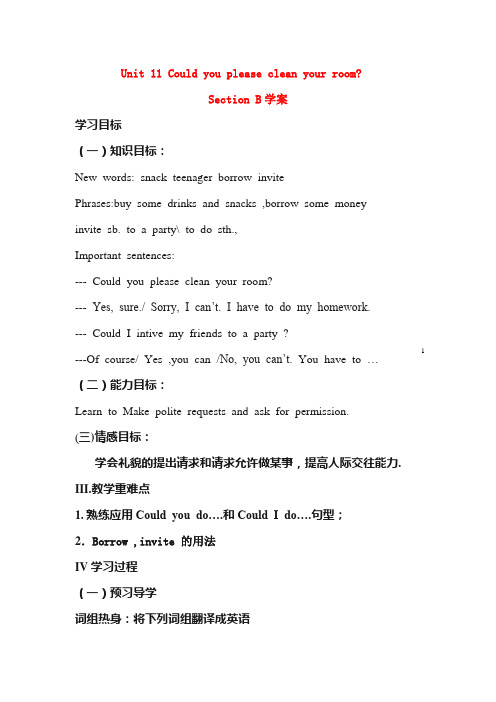
1Unit 11 Could you please clean your room?Section B 学案学习目标(一)知识目标:New words: snack teenager borrow invitePhrases:buy some drinks and snacks ,borrow some money invite sb. to a party\ to do sth.,Important sentences:--- Could you please clean your room?--- Yes, sure./ Sorry, I can’t. I have to do my homework. --- Could I intive my friends to a party ?---Of course/ Yes ,you can /No, you can’t. You have to …(二)能力目标:Learn to Make polite requests and ask for permission.(三)情感目标:学会礼貌的提出请求和请求允许做某事,提高人际交往能力. III.教学重难点1. 熟练应用Could you do….和Could I do….句型;2.Borrow ,invite 的用法IV 学习过程(一)预习导学词组热身:将下列词组翻译成英语2买些饮料小吃__________________借些钱___________打扫客厅_____________邀请我的朋友参加聚会_______________________去买东西_______________用一下你的影碟机______________________把垃圾带出去_______________整理你的床铺____________(二)自主学习1. 1a. What can teenages ask their parents to do? What do par ents ask their teenages to do? Write “parents” or “teenages”next toeach phrase in your book..2. 2a and 2b. Listen to the tape and finish 2a and 2b.(三) 合作探究1、Pairwork Use the phrases in 1a to make conversations with your partner.2、Groupwork You are having a party. Ask your partners for help. Talk about these things:go to the store buy drinks and snacks do the dishesclean the living room take out the trash.(四) 梳理归纳From this class, you should grasp:1、礼貌的要求及回答2、礼貌的请求允许及回答3.本课常用短语___________________________________________________________3 V 典题赏析1.—Can I ______this book ?—Yes, but you mustn ’t _____it to others.A.lend,borrowB.borrow,keepC.borrow,lendD.lend ,keep本题主要考查borrow 和lend 的区别。
人教版英语七年级下册【推荐】Unit11Howwasyourschooltrip(学案2)
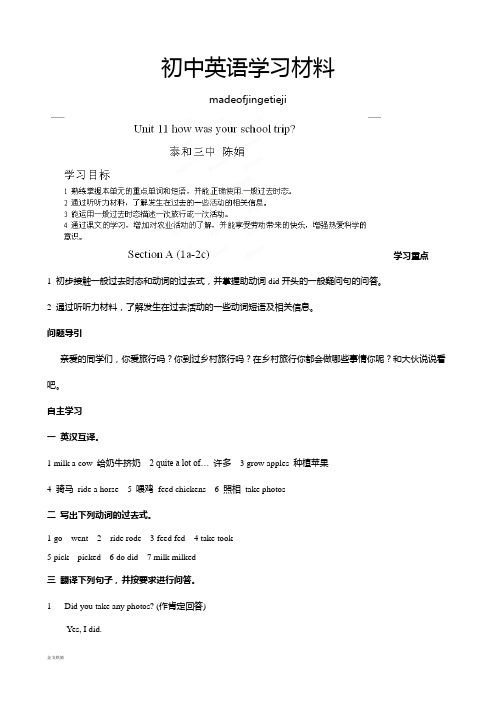
初中英语学习材料madeofjingetieji学习重点1 初步接触一般过去时态和动词的过去式,并掌握助动词did开头的一般疑问句的问答。
2 通过听听力材料,了解发生在过去活动的一些动词短语及相关信息。
问题导引亲爱的同学们,你爱旅行吗?你到过乡村旅行吗?在乡村旅行你都会做哪些事情你呢?和大伙说说看吧。
自主学习一英汉互译。
1 milk a cow 给奶牛挤奶2 quite a lot of… 许多3 grow apples 种植苹果4 骑马ride a horse5 喂鸡feed chickens6 照相take photos二写出下列动词的过去式。
1 go went2 ride rode3 feed fed4 take took5 pick picked6 do did7 milk milked三翻译下列句子,并按要求进行问答。
1 --- Did you take any photos? (作肯定回答)--- Yes, I did.2 ----Did they grow apples? (作否定回答)---- No, they didn’t.3 ---- Did he eat strawberries? (作否定回答)----No, he didn’t.四完成课本1a部分。
合作探究任务一和小组成员一起讨论一下问题。
1 Does your school have any school trips?2 What do you usually do on your school trip?图片1 参观博物馆visit museums图片2 爬山go to the mountains图片3 去农场go to the farm图片4 去动物园go to the zoo3 How was your last school trip?任务二1 听课本1b的录音,圈出Carol所做的三件事情,并按要求完成1c当中的对话练习。
人教版七年级下册Unit11 教材重难点学案设计(含一般过去时讲练) 无答案
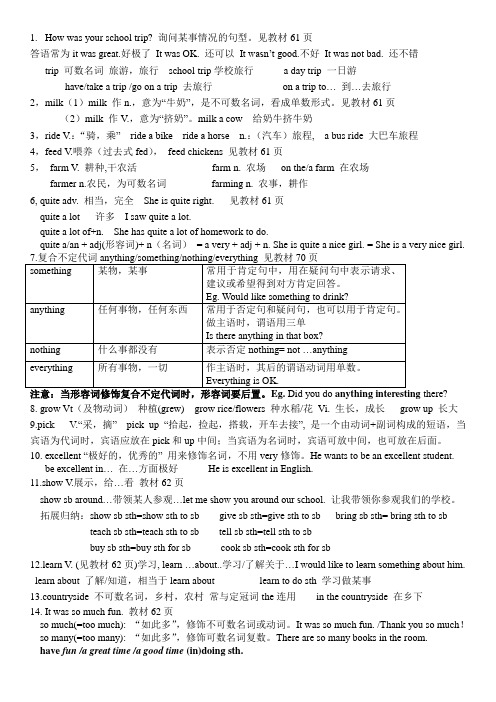
1.How was your school trip? 询问某事情况的句型。
见教材61页答语常为it was great.好极了It was OK. 还可以It wasn’t good.不好It was not bad. 还不错trip 可数名词旅游,旅行school trip学校旅行 a day trip 一日游have/take a trip /go on a trip 去旅行on a trip to… 到…去旅行2,milk(1)milk 作n.,意为“牛奶”,是不可数名词,看成单数形式。
见教材61页(2)milk 作V.,意为“挤奶”。
milk a cow 给奶牛挤牛奶3,ride V.:“骑,乘” ride a bike ride a horse n.:(汽车)旅程, a bus ride 大巴车旅程4,feed V.喂养(过去式fed),feed chickens 见教材61页5,farm V. 耕种,干农活farm n. 农场on the/a farm 在农场farmer n.农民,为可数名词farming n. 农事,耕作6, quite adv. 相当,完全She is quite right.见教材61页quite a lot 许多I saw quite a lot.quite a lot of+n. She has quite a lot of homework to do.quite a/an + adj(形容词)+ n(名词)= a very + adj + n. She is quite a nice girl. = She is a very nice girl.there?8. grow Vt(及物动词)种植(grew) grow rice/flowers 种水稻/花Vi. 生长,成长grow up 长大9.pick V.“采,摘” pi ck up “拾起,捡起,搭载,开车去接”, 是一个由动词+副词构成的短语,当宾语为代词时,宾语应放在pick和up中间;当宾语为名词时,宾语可放中间,也可放在后面。
六年级英语上册Unit11《Trees》导学案牛津上海版(深圳用)
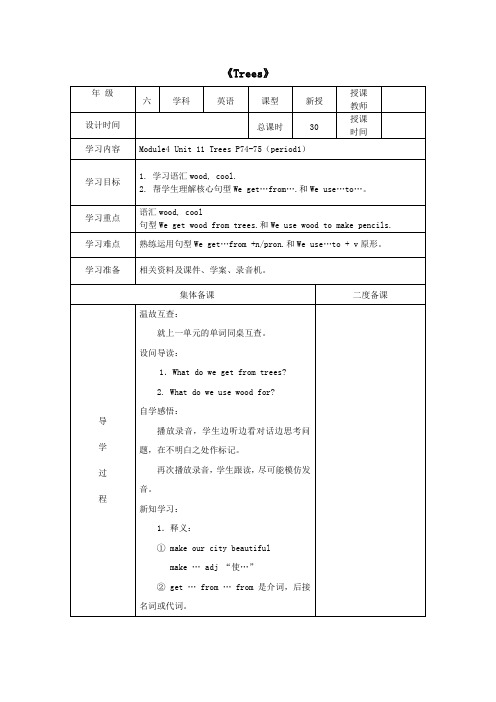
两人小组利用下面的对话进行练习:
S1:What do we get from trees?
S2:We get wood from trees.
S1:What do we use wood for?
S2:We use wood to make pencils.
巩固练习:
完成P75的反馈练习。
导学反思
学习准备
相关资料及课件、学案、录音机。
集体备课
二度备课
导
学
过
程
温故互查:
完成两导两练P92练习2,两人一组核对答案。
设问导读:
出示Read a story的挂图,让学生带着问题阅读故事。
1.Who’s the bird’s friend?
2.What did the workers do to the tree?
3.What does the girl use the match for?
自学感悟:
播放录音,学生边听边看故事边思考问题,找出答案,并在不明白之处作标记。
再次播放录音,学生跟读,尽可能
导
学
过
程
模仿发音。教师板书词组have to, cut…down, look for,并释义,学生齐读。
合作交流:
自学感悟:
播放录音,学生边听边看对话边思考问题,在不明白之处作标记。
再次播放录音,学生跟读,尽可能模仿发音。
新知学习:
1.释义:
①make our city beautiful
make…adj“使…”
②get…from…from是介词,后接名词或代词。
导
学
过
程
③use…to…. to后接动词原形。
(高一英语教案)新教材高一教案UNIT11(第3课时)-教学教案

新教材高一教案UNIT11〔第3课时〕-教学教案(Pre-reading \Reading\Post-reading)Step 1 Pre-reading1. Checking homework1) T asks the question: Do you play any musical instrument What is your favourite instrument In this way, Ss review names of kinds of musical instrument.1) T asks another question: Has anybody got any information about musical styles Ss tell different kinds of music, such asblues\hip-hop\rap\Latin music etc.Here is some information about music:Music is a language that is spoken to everyone—from the day we are born we hear music of some kind of our lives. But there are as many different kinds of music as different languages, and it is impossible to describe them all. Here are just a few well-known types.Classical music is serious Western European music from the Middle Ages(1500) to the present and it was often written for a large orchestra,or for a small group of players. Many instruments can be used. A lot of music was also written to be sung as opera. Classical music is very popular and schools often teach this type of music.Jazz developed in the Southern States of North America at the beginning of last century. The black people of these states, who were originally slaves from Africa, had their own rhythms. Jazz brought classical music and African rhythms together.Blues was originally Black Country music, which also came from the Southern States of last century. It is slow, usually sad music, which is often sung by one person with a guitar.Rhythm and blues developed from the Blues in America in the 1940s. It became faster and more complex and used more instruments, e.g. saxophone, guitar, piano, drums. The music was often about city life and white musicians started playing it as well.Musicians in the 1950s developed Rock from Rhythm and Blues and it became popular with young people. It spread to Europe in the 1960s and is now known in most countries. A lot of pop music comes from Rock and Roll.Pop music developed from Rock and Roll in America, Britain and Europe in the 1960s and is now in every country. The name is used for most commercial music, i.e. music we can buy on records and hear on “pop radio〞. It is usually played by groups who often use electricinstruments and make videos to go with their records.2. Pair-workHave Ss discuss these questions in pairs.1) What kind of music do you like2) When you listen to a song, do you listen to words or the music2) Do you like to listen to music form other countries3. A gamePlay some music played by different musical instruments, ask the Ss to guess what makes the song. (piano/guitar/trumpet/drum)Teach the English names of different musical instruments on the slide: violin, trumpet, guitar, jazz drum, mouth-organ, huqin(Chinese violin) etc.Step 2 Reading1. Fasting readingHave Ss read the passage as quickly as possible to find the answer to the question: How many kinds of music are mentioned in the passage and what are they2. Careful readingHave Ss read the passage carefully and fill in the form below according to the passage.。
Unit 11 How was your school trip人教版新目标七年级下册英语优秀教学设计 初一教案有教学反思
UNIT11 How was your school trip?Section A 第1课时(1a〜1c)自主学习方案1.自学生词,并记住拼读及拼写。
2.预习课本找出重点短语及句子。
(见学案自学导练内容)3.读记后完成自学导练内容。
课堂导学方案Step1 情景导入Teacher:We had a school trip last week. Did you have a good time? How was your school trip?Students : Not bad/Pretty good/Great/Terrible.Teacher :Did you take any photos?Did you feed chickens?What did you do?Please tell us what you did. Do you want to know what Carol did?环节说明:以上周的校游为话题,引出一般过去时态,简洁明了,直奔主题。
Step 2完成教材1a-1c的任务1.认真观察图片,将图片和la中所给的短语匹配。
集体核对答案,完成la。
(2分钟)2.教师领读la中的词组,学生跟读并且识记,然后两人一组互相提问。
以小组为单位总结动词过去式的构成规则,教师补充点拨。
(5分钟)3.大声朗读图片中的小对话,提前感知听力内容。
(2分钟)4.认真听录音,圈出Carol在校游时所做的事情,集体核对答案,完成lb的听力任务。
(3分钟)5.练习lc中的对话,并请学生表演。
(2分钟)6.模仿lc中的对话,利用la中的图片信息,两人一组来谈论Carol在校游时所做的事情,邀请几组学生来表演对话。
(4分钟)参考案例:A:Did Carol take any photos?B:Yes,she did. /No,she didn’t.7.小结训练。
(4分钟)(1)— What did Sam do on the farm?—He B chickens.A feedsB fedC grows(2)— C you to the zoo last Sunday?—No,I didn'.A. Do;goB. Are;going C . Did;go环节说明:听说结合,第一时间向学生传达语言目标,结对对话练习和小结训练,使语言目标得以强化。
人教版九年级全册英语Unit11 SectionB 知识讲解+专题练习学案(含答案)
Unit11 SectionB知识讲解1. Besides, winning or losing is only half the game.除此之外,输赢只是比赛的一半。
besides"除……以外还有",表示包括后面提到的人或物在内。
except"除去",表示不包括后面所提到的人或物在内。
2. He felt a heavy weight on his shoulders as he walked home alone. 当他独自走回家的时候,感到肩上有沉重的负担。
(1)weigh v. 称……的重量;衡量(2)shoulder n. 肩;肩膀3. He had let his whole team down. 他让整个团队失望了。
let sb down 不能帮助;不能支持(某人);使失望;放下;降低let sb down =make sb frustrated 使……失望或沮丧4. But whatever it was, don’t be too hard on yourself. 但是无论是什么事,都不要对自己太苛刻。
(1)whatever =no matter what 无论什么whoever = no matter who 无论谁wherever = no matter wherever 无论哪里(2)be hard on sb "对……很严厉;要求很苛刻;苛待(为难)某人"。
5. The next day, Peter went to soccer practice with courage rather than fear in his heart. 第二天,皮特并没有害怕,而是勇敢地去参加足球训练。
(1)courage n.勇气;勇敢(2)rather than"并非;而不是",是一个并列连词。
6. He felt like there was a heavy weight on his shoulders as he walked home alone.本句采用了省略连接词that的宾语从句,宾语从句中包含了There be句型,as的意思是"当……时候",引导时间状语从句。
八年级英语上:Unit 11 Could you please clean your room学案 人教新目标版
Unit 11 Could you please clean your room?复习指导:I.复习本单元单词、短语,熟练掌握。
1忙于,从事________________2.开会______________________3.喜欢做某事____________________4.多长时间一次______________________5.帮助做饭____________6.购物___________________7.照看________________8.与、、、、玩耍___________ 9.饮料和小吃_____________10.玩得高兴____________11.带他去散步_________________________12倒垃圾_______________________13.扫地________________14.叠衣服__________________II.语法:Could 的用法。
1. 本单元的语法主要涉及用来表示“请求”的日常交际用语:Could you please do sth……? Could I please do sth….?2.could 并非表示过去,只是在语气上比can更加委婉。
3.make 和do 的区别。
1.洗餐具___________________2铺床____________________3做家务____________4洗衣服_____________________5做早饭________________一. 根据句意和首字母完成单词。
1We s_________the floor just half an hour ago. 2. The boy h ________eating rice day after day.3 .Some t__________like surfing the Internet very much.4.Karen b _________a storybook from one of her friends.5. He a _________with me at the meeting yesterday.6 .Could I please get a r ______?Sorry ,you can’t .Because I have to go to a m _________.7 .You must f ______ your clothes at home. 8.Your coat is there and m_______is here.9.Tina h______ traveling by plane,but she likes taking a train.10.The girl i________many friends to her party last Sunday.二.根据汉语提示完成句子。
新七年级下英语Unit 11学案
Unit 11 How was your school trip? 第一课时主备:秦若铭同备:七年级英语组审核:陈桂杰【学习目标】1. 学习并记忆海洋动物的名称,会用there be 句型的一般过去式谈论动物。
2. 复习动词的过去式以及一般过去时态的肯定句、否定句和疑问句,并会用这些句式描述过去发生的事情。
3.阅读以“过去经历”为话题的课文,找出承上启下的连词,结合这些连词并根据概念图复述课文。
【自主预习】1. 写出下列动词的过去式和过去分词(1) see ________ (2) take________ (3) hang________ (4)buy______(5) sleep_______(6) get________ (7) meet________ (8) has/have________(9) eat________ (10)go______(11)win_______2. 写出下列单词,短语和句子(用动词的原形和过去时)(1)去海边/动物园/海洋馆_______________________(2)吃冰淇淋/汉堡____________________ (3)和朋友一起闲逛__________________________ (4)照相________________________________ (5 )买纪念品______________________________ (6)看海豹__________________________________ (7)得到姚明的亲笔签名______________________ (8)碰见一位著名的演员______________________ (9) 赢得一项奖励___________________________ (10)在你的上次学校旅行中__________________(11)看关于鲨鱼的电影_______________________(12) Laura 买纪念品了吗?_______________________________不,她没有。
- 1、下载文档前请自行甄别文档内容的完整性,平台不提供额外的编辑、内容补充、找答案等附加服务。
- 2、"仅部分预览"的文档,不可在线预览部分如存在完整性等问题,可反馈申请退款(可完整预览的文档不适用该条件!)。
- 3、如文档侵犯您的权益,请联系客服反馈,我们会尽快为您处理(人工客服工作时间:9:00-18:30)。
第1页 Where there is a will, there is a way.课题 Unit 11 Friendship学习目标:(一)知识目标:To train and improve the reading ability of the students. (二)能力目标:Have the students master some reading skills.(三)情感目标:Make the students know more about friendship and how to make friends. Step1: 导入(2 minutes )Revision about the words of this unit. Step2: 自学(15 minutes )①Get the Ss to read the passage by themselves and decide T or F.( ) 1.We may get on well with many people, but we make friends with only afew of them.( ) 2.People have different kinds of friends.( ) 3.Close friends are those who can share joys and sorrows with you. ( ) 4.A good friend is someone who will do anything for you. ( ) 5. A good friend is someone you can rely on when you are in need . ( ) 6.A chess partner is not a friend. ② Discuss the following questions in groups. 1. What should we do when our friends are in sorrow.2. We may get on well with many people. But why do we usually make friends with only a few of them?3. What kind of person do you think you can rely on?Step3:讨论 (10 minutes ) Discuss the answers in groups with your teammates. Step4:展示(8 minutes ) Please show your answers to the whole class. Step5:点评Step6:检测(3 minutes )Read the whole passage.Step7:反思 Write down what you have learned today on your notebooks(整理笔记)Step8:应用 Fill in the blanks. (7 minutes )We may ______ ______ _______ ______ a number of people, and we usually make friends______ them. You may have many good friends but only _____ _____ ______ them are your “ close friends ”. A close friend is someone who is able to _______ joys and sorrows _______ you. This is a person you can ______ ______ when you need help, and this is a person to whom you ______ ________ ______ lend a helping hand.Friendship play ______ _______ _______ in our lives. And it is one of life ’s greatest __________. Yet it would be ________ ________ to expect a friend to do everything for you. So we must learn to make friends and cherish(钟爱;珍视) friendship.第2页 Where there is a will, there is a way.课题 Unit 11 Friendship学习目标:(一)知识目标:To train and improve the reading ability of the students. (二)能力目标:Have the students master some language points.(三)情感目标:Make the students know more about friendship and how to make friends. Step1: 导入(5 minutes )Get the students to read the text. Step2: 自学(15 minutes )①Get the Ss to read the passage by themselves and find out the compoundsentences(找出文中复合句).1.We may have many friends, but we often don ’t clearly understand how we make friends.句中划线部分是由_______引导的___________ 从句。
完成句子: 1)Please let me know ___________________________ .(我能为你做点什么)2)Do you remember ________________________?(我们何时第一次见面的) 2. “Best friends ” or “close friends ” are usually people who have known each other for a long time.A close friend is someone who is able to share joys and sorrows with you. This is a person you can rely on when you need help.This is the person to whom you are willing to lend a helping hand.以上四个句子中划线部分均为________ 从句。
请找出先行词和关系词。
3. As a French writer said, “Don ’t walk in front of me.”As Coubertin once said,“The important thing is not winning, but taking part.” 以上两个句子中as 引导的是__________________从句。
4. 课文第二段最后两个句子均为______句,其中if 引导的是________从句.② Deal with the language points.1.It would be too much to expect a friend to do everything for you. 句中 it 作________ 主语,真正主语是_________________________. 1) 学习英语很容易。
________________________________________. 2)找个好朋友很难。
________________________________________.Step3:讨论 (5 minutes) Discuss the answers in groups with your teammates. Step4:展示(10 minutes) Please show your answers to the whole class Step5:点评Step6:检测: 翻译句子1)朋友在我们生活中起着重要的作用。
_______________________________________________________2)关系密切的朋友是那些能与你同甘共苦的人。
_______________________________________________________ 3)友谊是生活中最宝贵的财富之一。
_______________________________________________________ 4)翻译短语1 play an important part in… ______2 in our lives _____________3 make friends with…_____________4 get on well with… ____________5 a number of + 可数名词复数_______6 a few of them______________7 may have + 过去分词 He may have understood the problem._______8 each other ______________________9 since childhood ______________ 10 in fact ___________________11 different kinds of ________________ 12 such as _________________13 choose … for …______________ 14 play with… _________________15 play chess _______________ 16 close friends _____________17 for a long time_________________ 18 share joys and sorrows_________19 rely on __________________ 20 be willing to do_____________21 lend a helping hand to sb.__________ 22 one of life’s greatest treasures______23 too much ______________ 24 expect sb. to do sth.__________25 do everything for you____________ 26 a French writer_____________27 in front of …_________________Step7:反思 Write down what you have learned today on your notebooks(整理笔记)Step8:应用 (15 minutes) Writing:以 Friendship 为题写一篇短文.。
